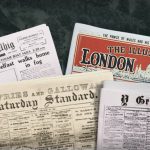As part of our ongoing partnership with the British Library, we are delighted to announce that one million more pages on the British Newspaper Archive have now been made free to view on our site, meaning that we now have two million pages in total that can be accessed freely as part of our collection.
And we’re not stopping here. We’re planning to release a total of five million free to view pages on The Archive over five years, meaning that more and more people will now be able to access the wonderful newspapers in our collection, all made possible by our partnership with the British Library.
To find out how to access our free to view newspaper collection, please click here. Alternatively, all you need to do is to register a free account with us, and filter your results by access type ‘Free to View.’
Register now and explore our free to view pages
But before you get searching, find out more about the wonderful additions we have made to our free to view collection this year below, whilst the details about the 2021 release can be found here.
An Overview
This year’s release sees 244 newspaper titles from across Britain, Ireland and India joining our free to view collection. The newspapers span four centuries of history, with our earliest free to view page hailing from 1699, and our latest from 1900.

For the first time on The Archive an Indian title is now free to view, Kolkata’s Friend of India and Statesman, which joins the Royal Gazette of Jamaica to help tell the often confronting story of the British Empire.
Meanwhile, joining our free to view collection are over 160,000 pages from Scotland, over 70,000 pages from Wales (including several Welsh language titles) and over 20,000 pages from the Republic of Ireland and Northern Ireland. The largest title to be released as free to view is the Glasgow Herald, which spans the years 1820 to 1900, and incorporates over 130,000 pages.

We have a host of unique and unusual newspapers joining our free to view collection this year, from a newspaper produced as a handkerchief, to one that was entirely spelled as spoken. We also have a range of fascinating Victorian illustrated titles that you can browse through for free, as well as some new free to view political and philosophical newspaper pages.
How have we chosen these titles to add to this year’s free to view release? Working with the British Library, we have selected titles from the 19th Century Newspaper project, which was funded by the Joint Information Systems Committee and was the British Library’s first major newspaper digitisation programme. We’ve also selected titles from the Heritage Made Digital digitisation project, another British Library project that seeks to ‘transform access’ to a range of British Library holdings, including newspapers. Many of the titles from the Heritage Made Digital project were published in London during the first part of the nineteenth century.
Finally, we’ve also included titles digitised by the Living With Machines research project, a collaboration between the British Library, the Alan Turing Institute and five partner universities, a pioneering look at life in the industrialised areas of Britain in the Victorian era.
To find out more about some of the highlights of this year’s free to view release, as well as to find a complete list of all the free to view titles that we have added, carry on reading. Or, start your free to view journey by registering with us, and having a browse of our free to view pages.
Unique and Unusual
One of the more unusual titles to be contained in this year’s free to view release is Berthold’s Political Handkerchief, which joined The Archive as part of the Heritage Made Digital project. What made Berthold’s Political Handkerchief stand out from the crowd when it appeared on the publishing scene in 1831 was that it was printed on calico, in a ploy to get round the newspaper stamp duty tax of the time.

Indeed, Berthold’s Political Handkerchief might have heralded a new trend for newspaper publication, its first issue proclaiming how ‘a piece of printed cotton may be read and then used for a thousand different purposes.’ However, the bold venture was not to last, the Political Handkerchief only appearing nine more times, whilst its founder Henry Berthold was eventually arrested and transported for theft.
Sitting alongside Berthold’s Political Handkerchief as one of the more unusual free to view titles is the Fonetic Nuz, which was first published on 6 January 1849. Founded by mathematician, philologist and phonetician Alexander J. Ellis (1814-1890), whose other claim to fame was being the prototype for Professor Henry Higgins in the George Bernard Shaw play Pygmalion, the Fonetic Nuz was published to promote phonetic spelling.

Ellis passionately believed that by instigating spelling reform, and using phonetics, the literacy rate in Britain could be improved. At the time the Fonetic Nuz was published, over half of the women married the previous year signed their name with a cross, with a third of men doing the same.
A noble endeavour, the publication of the Fonetic Nuz, in which everything was spelled as spoken, met with widespread ridicule amongst the British and Irish press. By the April of 1849 the Southern Reporter and Cork Commercial Courier reported that the newspaper had ‘already given up the ghost,’ although this was not strictly true. Despite support from areas, the Fonetic Nuz limped on to 25 May 1849, although the Cork Examiner was premature in marking its demise, printing the satirical obituary, authored by ‘Man in the Moon,’ below on 13 April 1849.

Illustrated

Bringing together Pen and Pencil were the publishers behind the new illustrated titles which have now been made free to view on the British Newspaper Archive. Published by J. Clayton, ‘Illustrated Family Newspaper‘ Pen and Pencil appeared on newsagent shelves on 10 February 1859, with the aims of uniting two qualities, which were ‘literary ability and artistic excellence.’
The first edition went on to explain how the new title would give a ‘well-arranged and interesting and clear digest of the week’s news, with illustrations really illustrating and helping to the better understanding of those news.’ Furthermore, it looked to better its more well-known rivals The Spectator and the Illustrated London News, featuring the impressive artwork of engraver William James Linton (1812-1897), who later emigrated to the United States. Whether or not Pen & Pencil succeeded in its aims, we will leave you to judge.

Another illustrated title joining our collection of free to view titles is Illustrated London Life, which made the bold claim (newspapers of this time were far from immune in making such claims) of being ‘one of the most extraordinary Publications ever offered to the World.’ Again, we will let you pass judgement on its extraordinariness, but this title survives just as its title suggests, as a wonderful illustrated record of life in London from 1843.

Aiming to ‘amuse the public without going far from town,’ Illustrated London Life treated its viewers to scenes from fashionable London site the Burlington Arcade, as well as from the less salubrious Billingsgate Market. It stands as a wonderful social record, and as a bonus, you can even make music from its pages, the publication often containing illustrated sheet music.
Political and Philosophical
Whilst we got political with Berthold’s Political Handkerchief, there are other political titles included in this year’s free to view release, which trace the turbulent political scene of the early nineteenth century.

Highlighting the decided prickliness of British politics was the wonderfully named Porcupine, a daily newspaper which first appeared on 30 October 1800. This was one of divisive politician and editor William Cobbett’s many newspaper titles, and the name of the newspaper was actually derived from a moniker given to Cobbett when he travelled to the United States in the 1790s. There, he advocated for British interests, and when he returned to Britain, he was hailed as a hero.
Cobbett’s Porcupine was firmly anti-revolution, and almost over the top in its dislike of France, the two nations being at war at the time. Indeed, Cobbett assured his readers that ‘the intrigues of the French, the servile, the insidious, the insinuating French, shall be the object of my constant attention.’ But Porcupine was not destined for a long life; Cobbett sold his share in the newspaper in 1801, and as the years went on, Cobbett himself became more and more of a radical, agitating for the reform against which he had been so opposed.

William Cobbett was not alone in the early nineteenth century in his rallying against the French nation. Enter the Anti-Gallican Monitor, which was founded by Lewis Goldsmith, who despite being himself Anglo-French, of Portuguese-Jewish origins, was thoroughly anti-revolution. The Anti-Gallican Monitor went so far as to call for the assassination of Napoleon Bonaparte for the good of Europe; something the British government had to condemn.

Shining a light, meanwhile, on the murky world of politics was the British Luminary, a weekly newspaper that ran from 1818 to 1823. With reforming zeal at the heart of its pages, it wondered whether it would be ‘a curious document for future reference,’ little imagining, we suppose, the day of its arrival on the British Newspaper Archive, and how it would form part of its free to view collection.
Joining the British Luminary on its quest for reform is The Patriot, which first appeared on 3 April 1792. Published in London, but anonymously edited by Sheffield-based Matthew Campbell Browne, The Patriot pushed for the reform of parliament and equal representation of the people. Matthew Campbell Browne himself was a strong advocate of parliamentary reform; detailing and debating throughout the pages of his newspaper the nature of government and the duties of civil liberty.

Offering an alternative philosophical and political viewpoint was the London Phalanx, which was dedicated to promoting the theories of Charles Fourier (1772-1837), who was an early exponent of socialist thinking. London Phalanx was first published on 3 April 1843, inspired by the thinking of Fourier, who is widely considered to be one of the founders of utopian socialism, and is also credited with originating the word ‘feminism.’ This publication, now accessible as part of our free to view collection, aimed to ‘draw the attention of the British Public to those Principles of general Policy and Social Progress which have been brought to light by the genius of the late Charles Fourier.’
And Much, Much More
And if you’re thinking that it’s from our new free to view pages, you’d be wrong. There is so much more to discover, which you can do by registering with us today, and searching our free to view pages.
From our wonderful Welsh language titles Y Tyst and Y Llan, to the historic regional titles of the Bristol Mercury, the Lancaster Gazette and the Exeter Flying Post, from early railway title the Railway Bell and London Advertiser, to scurrilous gossip engine The Age, there is so much for you to discover within our free to view pages.
And why not let us know about your discoveries? You can tweet us at @BNArchive, or connect with us on Instagram (thebritishnewspaperarchive). We’re on Facebook too.
Meanwhile, here’s a full list of all the titles and year ranges that form part of the 2022 free to view release. Enjoy!







